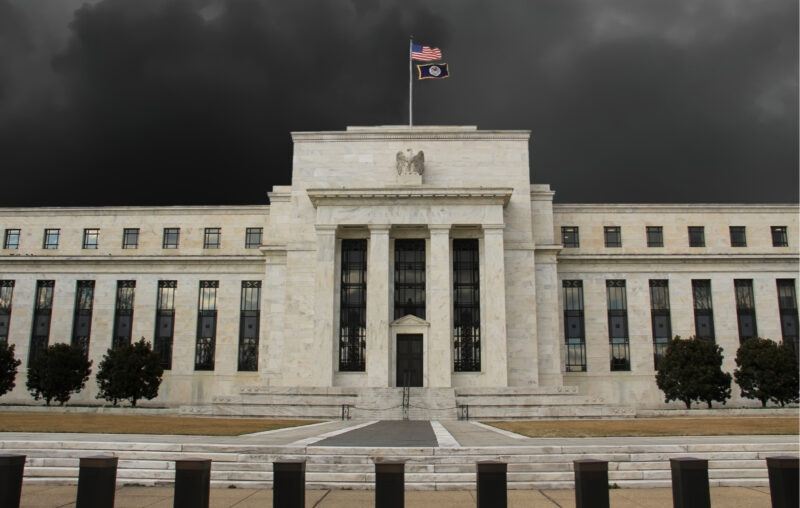
Economist Judy Shelton has a crackerjack column in tomorrow’s Wall Street Journal on the lack of intellectual and policy diversity at the Federal Reserve. She points out that during the entire term of Chairman Jerome Powell and his predecessor, Janet Yellen, not a single dissenting vote was recorded among the governors. It reminds us of the central bank of the Soviet Union.
Is that what we want — GosFed? That’s our jibe, not Ms. Shelton’s. It’s a play on Gosbank, for Gosudarstvenny Bank, the name of the Soviet central bank. It’s not our intention to suggest that our Fed or anyone associated with it is a communist. All the more mystifying, though, is the absence of dissent among GosFed governors, particularly when a new administration is readying vast new spending.
It “may surprise people to learn,” Ms. Shelton writes, “that not a single dissenting vote was cast by any member of the Fed’s Board of Governors throughout the eight monetary-policy meetings in 2020 and the three meetings held so far this year. The same is true for 2019, 2018, 2017, 2016, 2015 and 2014, covering Mr. Powell’s years as Fed chairman and the entire term of his predecessor, Janet Yellen.”
“No Fed governor,” Ms. Shelton adds, “cast a dissenting vote from the Fed chair at any monetary policy meeting held throughout that time.” Presidents of regional Fed banks have during this period done some dissenting in the open market committee, but no break by a Fed governor with the chairman has fetched up on our scope in recent years.
It’s all the more powerful a point if one considers the unprecedented growth of the Fed balance sheet, which is now something like $7.8 trillion. Most of the securities that make up that debt, even if acquired on the open market, are obligations of the government of which the Fed is a part. That, incidentally, is how GosBank worked. Ms. Shelton wrote a warning about that, too, and also in the Wall Street Journal.
That piece, issued in July 2012, was called “The Soviet Banking System — and Ours.” Ms. Shelton wrote that “[u]nder Soviet accounting practices, the true gap between concurrent revenues generated by the economy and the expenditures needed to sustain the nation was obscured by a phantom ‘plug’ figure that ostensibly reflected the working capital furnished by the Soviet central bank, Gosbank.”
That is, as she puts it at one point, “The Soviet central bank was making up for the difference between government revenues and government expenditures by creating empty credits to be disbursed by central-planning bureaucrats.” When Mikhail Gorbachev acceded to party boss in 1985, Ms. Shelton writes, the budget deficit the central bank was covering was more than 30% of total government expenditures.
Neither Ms. Shelton, as we read her pieces, nor we are suggesting the American economy is at quite that point or is false in the sense that the Soviet Union’s was. The system of having the Gosbank create money to fund the state, though, didn’t turn out so well. It’s getting harder by the year to see, as well, how the GosFed is going to come out whole in the end as well.
It’s maddening to see the Fed governors plunge down this road without recorded dissent. We made this point when the Democrats on the Senate Banking Committee were maneuvering to block Ms. Shelton’s nomination to a Fed governorship because she isn’t a “mainstream” economist. So did the Wall Street Journal. As did James Grant, who in 2016 wrote about a call by Democrats for more diversity at the Fed.
Mr. Grant, in his Interest Rate Observer, noted that what the solons — including, among others, Senators Bernie Sanders and Elizabeth Warren — wanted was diversity in race and gender on the mostly male and white Fed boards. Mr. Grant focused on “the kind of diversity that would leave the monetary establishment constructively rattled” — governors and economists who would question 21st century monetary dogma.
That question looms today at not only the Fed. We now have, in Janet Yellen, a former chairwoman of the Fed as Treasury Secretary. Dissent is also scant between the Fed and Treasury, as we launch these multi-trillion-dollar commitments. It’s easy to see why the comrades of Gosbank showed so little dissent. Say, or think, the wrong thing in the Soviet Union, and you risked a one-way ticket to Siberia. What in the world is GosFed’s excuse?
Reprinted with permission from The New York Sun

0 Comments